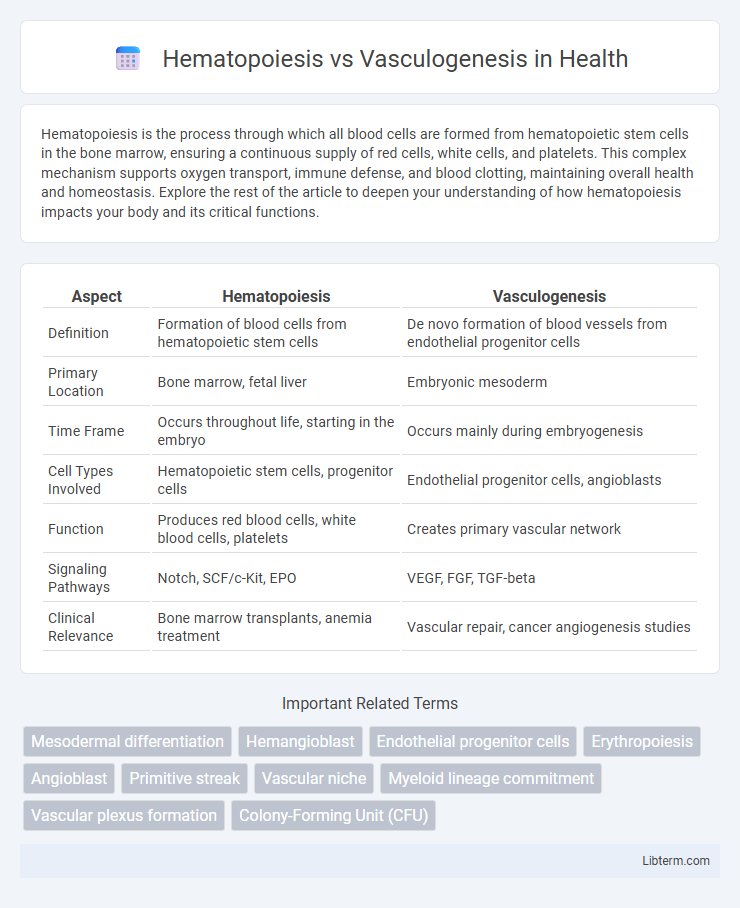Hematopoiesis is the process through which all blood cells are formed from hematopoietic stem cells in the bone marrow, ensuring a continuous supply of red cells, white cells, and platelets. This complex mechanism supports oxygen transport, immune defense, and blood clotting, maintaining overall health and homeostasis. Explore the rest of the article to deepen your understanding of how hematopoiesis impacts your body and its critical functions.
Table of Comparison
| Aspect | Hematopoiesis | Vasculogenesis |
|---|---|---|
| Definition | Formation of blood cells from hematopoietic stem cells | De novo formation of blood vessels from endothelial progenitor cells |
| Primary Location | Bone marrow, fetal liver | Embryonic mesoderm |
| Time Frame | Occurs throughout life, starting in the embryo | Occurs mainly during embryogenesis |
| Cell Types Involved | Hematopoietic stem cells, progenitor cells | Endothelial progenitor cells, angioblasts |
| Function | Produces red blood cells, white blood cells, platelets | Creates primary vascular network |
| Signaling Pathways | Notch, SCF/c-Kit, EPO | VEGF, FGF, TGF-beta |
| Clinical Relevance | Bone marrow transplants, anemia treatment | Vascular repair, cancer angiogenesis studies |
Introduction to Hematopoiesis and Vasculogenesis
Hematopoiesis is the process of blood cell formation, originating from hematopoietic stem cells in the bone marrow that differentiate into various blood lineages. Vasculogenesis involves the de novo formation of blood vessels from endothelial progenitor cells during embryonic development, distinct from angiogenesis which remodels existing vessels. Both processes are crucial for vascular and hematopoietic system development, with hematopoiesis primarily producing blood components and vasculogenesis establishing the initial vascular network.
Defining Hematopoiesis: Blood Cell Formation
Hematopoiesis is the biological process of blood cell formation, where hematopoietic stem cells in the bone marrow differentiate into various blood cell types, including red blood cells, white blood cells, and platelets. This process ensures the continuous renewal of blood components essential for oxygen transport, immune response, and clotting. In contrast, vasculogenesis refers to the de novo formation of blood vessels from endothelial progenitor cells during embryonic development.
Understanding Vasculogenesis: Vessel Development
Vasculogenesis is the process of new blood vessel formation from endothelial progenitor cells, primarily occurring during embryonic development. Unlike hematopoiesis, which generates blood cells, vasculogenesis focuses on assembling a primitive vascular network essential for tissue oxygenation and nutrient delivery. This process involves the differentiation, migration, and organization of endothelial cells into tubular structures that establish the foundational vasculature.
Embryological Origins: Hematopoietic vs. Vascular Systems
Hematopoiesis originates from mesodermal hemangioblasts that differentiate into hematopoietic stem cells responsible for blood cell formation during embryogenesis. Vasculogenesis arises from angioblasts derived from the mesoderm, which aggregate to form primitive blood vessels in the early embryo. These distinct embryological origins highlight the parallel yet specialized development of the hematopoietic system and the vascular network.
Key Molecular Pathways in Hematopoiesis
Hematopoiesis is primarily regulated by key molecular pathways involving transcription factors such as GATA-1, PU.1, and RUNX1, which govern lineage commitment and differentiation of hematopoietic stem cells (HSCs). Signaling cascades like Notch, Wnt, and cytokine-mediated pathways (e.g., erythropoietin and thrombopoietin) critically modulate HSC self-renewal and proliferation. In contrast, vasculogenesis depends more on VEGF and angiopoietin signaling to initiate endothelial cell differentiation and blood vessel formation.
Major Signaling Mechanisms in Vasculogenesis
Vasculogenesis is primarily regulated by signaling pathways involving Vascular Endothelial Growth Factor (VEGF) and its receptors, which promote endothelial cell differentiation and migration essential for new blood vessel formation. The Notch signaling pathway also plays a crucial role by controlling the balance between endothelial cell proliferation and arterial-venous specification during vascular development. In contrast to hematopoiesis, which centers on hematopoietic stem cell differentiation driven by factors like hematopoietic cytokines, vasculogenesis depends heavily on angiogenic signals that initiate and guide the formation of primitive vascular networks.
Comparative Timeline: When Do Processes Occur?
Hematopoiesis begins in the yolk sac around day 16 to 18 of embryonic development, producing primitive blood cells, while vasculogenesis starts slightly earlier, around day 15, with the formation of blood vessels from mesodermal angioblasts. During the mid-embryonic stage, definitive hematopoiesis shifts to the fetal liver by approximately week 6 and subsequently to the bone marrow by week 20, whereas vasculogenesis primarily occurs in early development followed by angiogenesis for vessel expansion. These distinct timelines reflect the sequential establishment of circulatory and hematopoietic systems critical for embryonic survival and growth.
Cellular Players: Stem Cells in Hematopoiesis and Vasculogenesis
Hematopoiesis primarily relies on hematopoietic stem cells (HSCs) located in the bone marrow, which differentiate into various blood cell lineages including erythrocytes, leukocytes, and platelets. In contrast, vasculogenesis involves endothelial progenitor cells (EPCs) derived from mesodermal precursors that form the initial vascular network during embryonic development. Both processes depend on stem cells but diverge in lineage commitment, with HSCs generating blood cells and EPCs specializing in vascular endothelial cells.
Clinical Implications and Disorders
Hematopoiesis, the process of blood cell formation, is crucial for maintaining immune system function and oxygen transport, with disruptions leading to disorders such as anemia, leukemia, and myelodysplastic syndromes. Vasculogenesis involves the de novo formation of blood vessels and is critical during embryonic development and tissue repair, with abnormalities linked to congenital vascular malformations and ischemic diseases. Understanding the distinct molecular pathways and clinical outcomes of hematopoiesis and vasculogenesis informs targeted therapies in regenerative medicine and vascular disorders.
Future Directions and Research Opportunities
Advancements in single-cell RNA sequencing and lineage tracing technologies offer promising avenues for deeper exploration of hematopoiesis and vasculogenesis, enabling more precise identification of progenitor populations and molecular regulators. Emerging research in bioengineering and regenerative medicine aims to harness these processes to develop innovative therapies for blood disorders and vascular diseases through stem cell manipulation and tissue engineering. Investigations into the interplay between hematopoietic stem cells and endothelial niches are crucial to uncovering novel targets for enhancing tissue regeneration and combating malignancies.
Hematopoiesis Infographic

 libterm.com
libterm.com